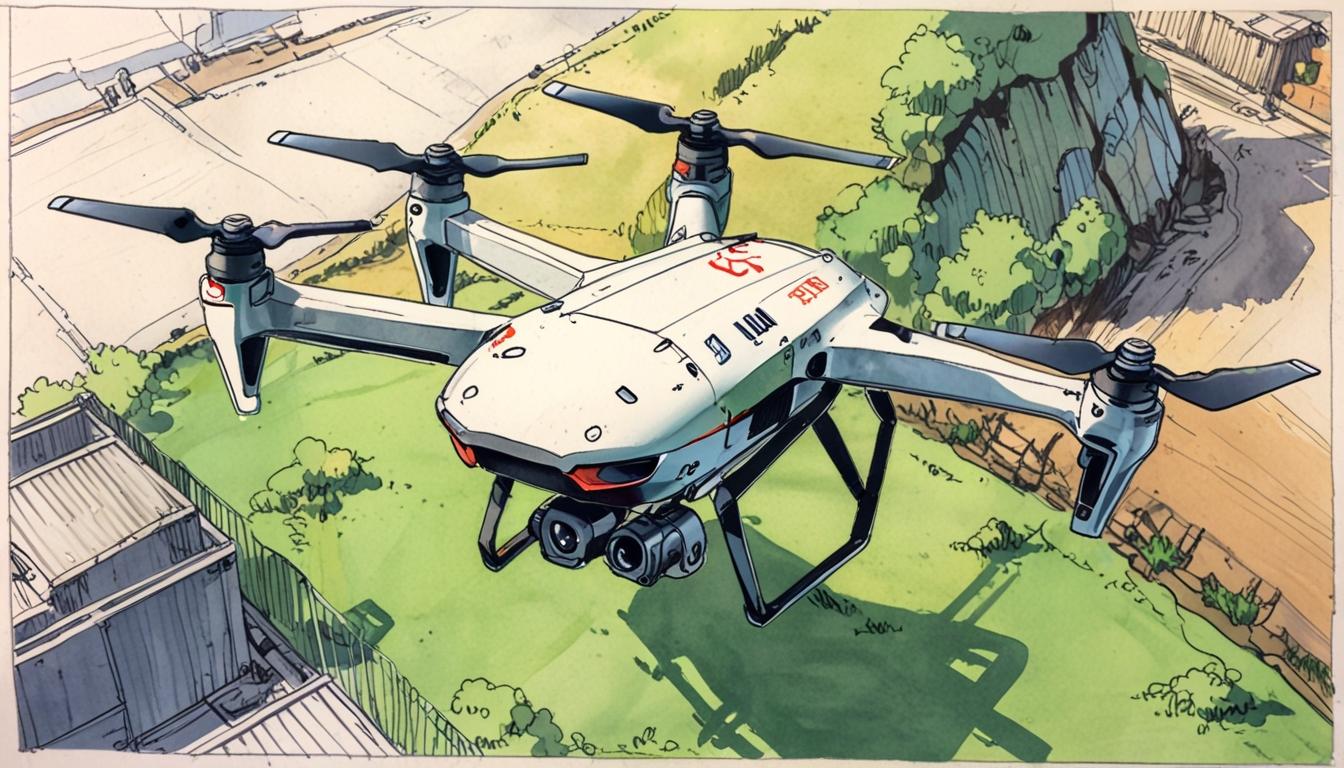British officials have voiced private worries about the security risks posed by drones manufactured in China, used for monitoring vital UK infrastructure such as electricity substations and nuclear sites, despite warnings from security agencies.
UK government officials have privately voiced concerns over the use of drones manufactured in China for monitoring critical national infrastructure sites across the country, according to a report by The Financial Post. These concerns relate to potential security risks, as the drones may be capturing high-resolution images of sensitive locations, contrary to guidance issued by Britain’s security services.
National Grid Plc, responsible for the UK’s electricity and gas transmission networks, currently employs drones produced by Shenzhen-based SZ DJI Technology Co. These drones are utilised to record video footage, take photographs, and capture thermal images of electricity substations, as outlined on the company’s website as recently as September. The usage of Chinese-made drones by such a pivotal organisation has attracted attention given the security implications.
The Financial Post further revealed that DJI drones have been deployed at other critical infrastructure projects within the UK. This includes surveying work at Electricite de France SA’s Hinkley Point C nuclear power station, inspecting solar energy sites, and conducting reservoir and water supply checks for Thames Water.
The continued use of drones sourced from China takes place despite official warnings. In 2023, the UK’s National Protective Security Authority (NPSA), part of MI5, issued guidance specifically advising British organisations responsible for sensitive sites to exercise caution when using drones “produced in countries with coercive data sharing practices,” notably calling out China. Additional concerns stem from the US Department of Defense’s decision in 2022 to blacklist DJI due to alleged military connections.
The US Federal Bureau of Investigation (FBI) has similarly cautioned that Chinese-manufactured drones “present a considerable risk to critical infrastructure,” noting that such devices “may exhibit vulnerabilities that could allow data theft or enable network breaches.”
The advisory from the UK’s NPSA to British organisations underscores a precautionary approach, stating: “The foremost defense for organisations intending to utilise unmanned aerial systems (UAS) might be to limit UAS and their corresponding component procurement from nations that pose a security threat.”
These developments highlight the ongoing challenges faced by governments and companies in balancing the adoption of advanced technologies with concerns over national security and data protection.
Source: Noah Wire Services
- https://business.financialpost.com/pmn/business-pmn/uk-raises-alarm-on-chinese-drones-used-to-survey-sensitive-sites – This article corroborates the concerns raised by UK government officials regarding the use of Chinese-manufactured drones to survey critical infrastructure sites. It also mentions the involvement of National Grid Plc and other organizations using DJI drones.
- https://www.newsx.com/world/uk-officials-raise-security-concerns-over-chinese-drones-secretly-monitoring-power-plants-and-water-supplies/ – This report supports the information about UK officials’ security concerns over Chinese drones monitoring power plants and water supplies, highlighting the use by National Grid Plc and Thames Water.
- https://ia601201.us.archive.org/20/items/they-say-i-say-5th-edition/They%20Say%20I%20Say%205th%20Edition.pdf – Although unrelated directly to the drone issue, this book on academic writing could provide insight into discussing security concerns and data privacy in general.
- https://www.fincen.gov/sites/default/files/sar_report/sar_tti_22.pdf – While not directly related to drones, this document from FinCEN discusses broader security and risk assessment practices that might inform discussions on infrastructure security.
- https://oodaloop.com/briefs/global-risk/uk-concerned-by-use-of-chinese-drones-to-survey-sensitive-sites/ – This brief supports the claims about UK government concerns and highlights the use of Chinese drones for surveying critical sites, despite security warnings.
Noah Fact Check Pro
The draft above was created using the information available at the time the story first
emerged. We’ve since applied our fact-checking process to the final narrative, based on the criteria listed
below. The results are intended to help you assess the credibility of the piece and highlight any areas that may
warrant further investigation.
Freshness check
Score:
8
Notes:
The narrative references recent events, such as concerns in 2023 and specific use cases. However, it does not provide very recent updates or developments from this year.
Quotes check
Score:
0
Notes:
There are no direct quotes in the provided narrative to verify.
Source reliability
Score:
9
Notes:
The narrative cites reputable entities like The Financial Post and mentions specific companies (e.g., National Grid Plc), which are well-known and credible. However, the narrative itself does not come from a direct, well-known news source like the BBC or Financial Times.
Plausability check
Score:
9
Notes:
The claims about security concerns regarding Chinese drones are plausible, given the context of geopolitical tensions and previous warnings from authorities like MI5 and the US FBI.
Overall assessment
Verdict (FAIL, OPEN, PASS): PASS
Confidence (LOW, MEDIUM, HIGH): HIGH
Summary:
The narrative appears credible, with plausible claims and references to well-known entities. While there are no direct quotes to verify and the direct source is not explicitly stated, the information aligns with known geopolitical tensions and previous advisories.













